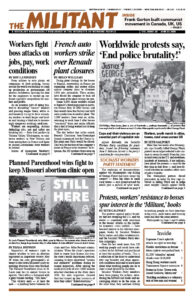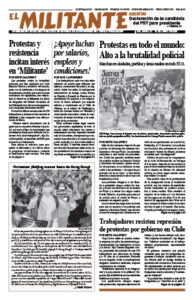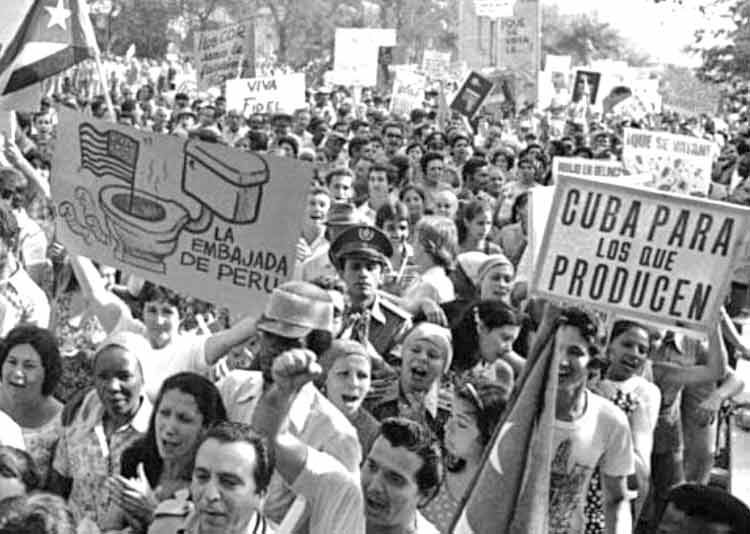Cuba’s Internationalist Foreign Policy 1975-80 by Fidel Castro is one of Pathfinder’s Books of the Month for June. Castro was the central leader of the Cuban Revolution that triumphed in 1959. Excerpted here is his 1980 “Speech to the Fighting People,” given at the May Day rally in Havana. The Cuban government and people were responding to a series of military threats and provocations by the Democratic administration of Jimmy Carter against the 1979 revolution in Nicaragua and rising struggles in the region. Five million people mobilized nationwide May 17 in a March of the Fighting People to stay Washington’s hand. Copyright © 1981 by Pathfinder Press. Reprinted by permission.
Mariel was opened, and we were rigorously, strictly complying with our watchword that anyone who wanted to go to any other country that would accept them could do so [Shouts of “Good riddance!”] and that the building of socialism, the work of the revolution, was a task for free men and women. Don’t forget this principle; don’t forget this principle; which has tremendous moral value. [Applause] …
[Washington’s] main concern was over the revolutionary triumph in Nicaragua and the growing upsurge in the revolutionary movement in Central America. It began to prepare a mechanism for intervention. Naturally, it used the pretext of the Soviet military personnel in Cuba to pressure and threaten Cuba, and it carried out small-scale maneuvers at the Guantánamo base at the end of last year. These maneuvers, however, are much larger, on a much greater scale, with more equipment and more soldiers — and something strange about them. And we said, No, no, no; this cannot be. We are not going to sit by passively while the Yankees organize maneuvers like that.
As has already been said, they are a flagrant rehearsal for an invasion of our country, a shameless invasion rehearsal on our own soil. This, really, is what is intolerable, unacceptable: maneuvers for invading Cuba — held on our own soil. …
The United States has imposed a blockade against Cuba for more than twenty years, a tight economic blockade that even prohibits the sale of foodstuffs and medicines — even medicines! It has been a brutal thing, for twenty-one years.
The United States occupies a part of our territory by means of force, against the will of our people. What doctrine, what principles, what law, and what legality justify its maintenance of a naval base in the territory of another country, against the will of its people? This has no legal, juridical, or moral basis, absolutely no basis in principles; it is simply an act of force.
The United States sends modern SR-71 planes over Cuba’s territory. They fly between 25,000 and 30,000 meters up, at very high speeds. They are what cause those unusual explosions that can be heard every so often throughout our country, as they break the sound barrier, shaking the walls, the glass, and the windows whenever they fly past. [Someone shouts “Shoot them down!”] It isn’t easy to bring down an SR-71; it isn’t very easy, technically.
Now, is it legal for them to do that? Is it legal to blockade our country? Is it legal to have a naval base on our soil? Is it legal to violate our airspace? [Shouts of “No!”] They do these things. And then, there are the maneuvers.
And that isn’t all imperialism has done over the years. Many of the comrades who have spoken here have mentioned it and also referred to La Coubre, Playa Girón, the Escambray, the acts of sabotage, the plans for subversion, the attempts to introduce and the introduction of agricultural blights, the plans to assassinate the leaders of the revolution, the sabotage of the Cubana plane off Barbados. …
It seems that now they’re saying they’ll restrict the maneuvers to the Florida coast and the East Coast of the United States. We know that these maneuvers are directed against us, Central America, and the Caribbean, but we aren’t going to contest their right to hold maneuvers there in U.S. territory. What we do contest is their right to hold maneuvers on Cuban soil.
Doubtless, this is a noteworthy victory for our people’s struggle and international solidarity. [Applause] Therefore the Cuban government will suspend the special maneuvers that the Eastern Army was going to hold under the name of Girón 19, which were to have begun on May 7. [Applause]
But the March of the Fighting People is still on; the March of the Fighting People is still on! [Applause] The March of the Fighting People was to be not only against the maneuvers but also against the blockade, against the Guantánamo base, and against the SR-71 spy flights. [Applause] We aren’t going to let the Yankees get an advantage by demobilizing the people in the middle of the battle. [Shouts of “Never!”]
The March of the Fighting People must go on, and it has to be even stronger than the march of April 19. [Applause] It is a people’s mobilization against the blockade; against the Guantánamo base; and against the violation of our airspace. Rather than sit back quietly, we should show world public opinion our rejection of and our militant opposition to all that. …
The party has issued instructions to the armed forces to create the Territorial Troop Militia as an additional force. [Applause] This militia will be composed of men and women, workers, farmers, students — everyone who is able to fight — to be organized and united so they can defend every bit of our national territory. [Applause] Everyone who can fight and isn’t already a member of the reserve units of the regular troops can belong to the Territorial Troop Militia.
Let our enemies see clearly that, in Cuba — as in Nicaragua, though, logically, Cuba has a much stronger army than Nicaragua, because Cuba has had much more time and has a larger population — let them see that if they attack Cuba they will have to face not only a regular war but also a people’s war. This means two things: resistance by the regular units and resistance by all the people.
Do you know what makes us really strong — us, Nicaragua, and Grenada? The fact that ours are people’s revolutions, revolutions with deep roots and great support among the people.


